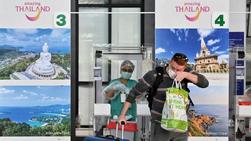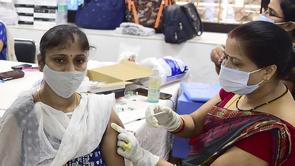 In this file photo taken on July 1, 2021, an international passenger reacts after a medical worker gave him a COVID-19 swab test following his arrival for the “Phuket Sandbox” tourism scheme that allows the entry of vaccinated visitors, at Phuket International Airport in Phuket, Thailand. (LILLIAN SUWANRUMPHA / AFP)
In this file photo taken on July 1, 2021, an international passenger reacts after a medical worker gave him a COVID-19 swab test following his arrival for the “Phuket Sandbox” tourism scheme that allows the entry of vaccinated visitors, at Phuket International Airport in Phuket, Thailand. (LILLIAN SUWANRUMPHA / AFP)
MUMBAI / YANGON - Thailand’s new COVID-19 infections decreased for a second day ahead as the Southeast Asian nation plans to further ease restrictions ahead of a reopening for tourism from Oct 31.
The country reported 9,351 new cases and 56 new deaths on Sunday.
Thailand, one of the Asia-Pacific's most popular tourist destinations, has for the past 18 months enforced strict pandemic entry rules.
Thailand, one of the Asia-Pacific's most popular tourist destinations, has for the past 18 months enforced strict pandemic entry rules
COVID-19 has cost Thailand about 3 million tourism-dependent jobs and an estimated $50 billion a year in revenue. Since July it reopened Phuket and Samui islands in pilot projects.
The capital Bangkok and other top destinations like Pattaya, Hua Hin, Krabi and Chiang Mai, will reopen from Nov. 1 to vaccinated visitors from 45 nations, who must produce negative COVID-19 tests before and after arrival, plus COVID-19 insurance cover of at least $50,000.
Nighttime curfews in those areas will also be lifted.
"Reopening pilot tourism areas to more foreign visitors, will benefit the overall economy and jobs, particularly the tourism sector and related businesses," said Thai coronavirus task force spokeswoman Apisamai Srirangsan.
While tourism has been decimated in many countries, the impact in Thailand has been severe, with authorities targeting 100,000 arrivals this year, compared with nearly 40 million before the pandemic.
The eligible countries for quarantine exemption include Britain, the United States, Canada, Germany, France, Australia, China, Japan, Singapore, Malaysia and Cambodia.
Visitors must have spent 21 consecutive days in those countries beforehand, unless Thailand was the original departure point, and must arrive by plane, among other requirements.
Prime Minister Prayuth Chan-ocha last week said entertainment venues would reopen by Dec 1.
Australia
Australia’s Victoria State will open up further from Oct 29, when the state is expected reach an 80 percent double-dose vaccination rate, Victoria Premier Daniel Andrews said Sunday.
People living in Melbourne, which last week ended one of the world’s longest lockdowns, will be able to travel to regional areas of the state and interstate from 6 pm local time on Friday. Rules for gatherings will also be eased and entertainment venues will reopen.
India
Life expectancy of Indians has dropped by close to two years due to the COVID-19 pandemic, as per statistical analysis published by a Mumbai-based state-run institution on Saturday.
"The life expectancy at birth in 2019 was 69.5 years for men and 72 years for women, which came down to 67.5 years and 69.8 years, respectively, in 2020," said the study published in the health journal by Mumbai's civic body.
The pandemic has wiped out the progress made in the last decade to increase the life expectancy in India
The study was authored by Suryakant Yadav, an assistant professor at the city-based International Institute for Population Studies to look at the burden repercussions of the pandemic on mortality patterns in Asia's third largest economy.
"The 35-79 age group had excess deaths caused by COVID-19 in 2020 as compared to normal years and it is this group that has contributed immensely to the drop," Yadav said in his study.
ALSO READ: India builds vaccine stocks to lift shipments globally
So far, India has reported 453,708 deaths due to COVID-19.
According to Yadav, the pandemic has wiped out the progress made in the last decade to increase the life expectancy figure and India's life expectancy at birth now is the same as it was in 2010.
 A medical worker (right) inoculates a woman with a dose of the Covishield vaccine against the Covid-19 coronavirus at a hospital in Allahabad on Oct 18, 2021.
(SANJAY KANOJIA / AFP)
A medical worker (right) inoculates a woman with a dose of the Covishield vaccine against the Covid-19 coronavirus at a hospital in Allahabad on Oct 18, 2021.
(SANJAY KANOJIA / AFP)
Iran
Iran's Health Ministry on Sunday reported 9,174 new COVID-19 cases, taking the country's total infections to 5,860,844.
The pandemic also claimed 171 lives in the past 24 hours, taking the tally to 125,223, Iran's Ministry of Health and Medical Education said in an update.
A total of 5,416,691 people have recovered from the disease or been discharged from hospitals across the country, while 4,294 remain in intensive care units, the ministry added.
By Sunday, 50,843,578 Iranians have received their first doses of COVID-19 vaccines, and 29,503,783 of them have taken two jabs.
The report said that 34,765,163 tests have so far been carried out across the country.
Israel
Israel will allocate 10 billion shekels (about $3.12 billion) for dealing with future possible coronavirus outbreaks, Prime Minister Naftali Bennett said Sunday.
"We are currently exiting from the Delta wave and more outbreaks are expected also in Israel," Bennett said at the opening of his weekly cabinet meeting, according to a statement issued by his office.
The new budget would be earmarked for an economic and medical safety net for future waves and the plan has been agreed by Bennett and Finance Minister Avigdor Liberman as a one-time expansion of the budgetary framework for 2022.
"Israeli model is based on keeping the country open and vaccinations, in addition to careful measures, and micro-managing the situation on a daily basis while taking all considerations, not just the epidemiological, into account," said the prime minister.
So far, some 42 percent of the country's 9.3 million people have received the third COVID-19 vaccine dose, according to official figures issued by the Health Ministry on Sunday.
Israel reports 324 new COVID cases on Sunday, while the overall number of severe cases was 307, according to the Health Ministry.
Myanmar
Myanmar's Central Committee on Prevention, Control and Treatment for COVID-19 on Saturday announced further extension of the closure of schools nationwide until the end of October.
The move was made in order to curb the spread of COVID-19 and to make preparations for reopening schools, the committee said.
The Ministry of Health has been administering COVID-19 vaccine doses to middle and high school students aged over 12 years since Oct 12.
ALSO READ: UN: Myanmar faces humanitarian crisis
As part of the anti-pandemic measures, the authorities re-closed all schools across the Asian country since early July.
According to a health ministry release on Saturday, Myanmar recorded 1,067 new confirmed cases of COVID-19 and 20 more deaths in the past 24 hours.
The total number of COVID-19 infections has risen to 493,576 with 18,511 deaths in the country.
Myanmar detected its first two COVID-19 cases on March 23 last year.
Philippines
China donated another batch of Sinovac CoronaVac vaccines to the Philippines on Sunday to support the country's COVID-19 vaccination campaign.
The donation arrived in Manila along with the vaccines of the same brand that the Philippines purchased from China.
In a brief statement to reporters at the airport, Chinese ambassador to the Philippines Huang Xilian said the fresh vaccine delivery "demonstrates the kind of friendship from the Chinese government and people" to the Philippines.
Huang expressed hope that the vaccines from China would further contribute to bringing down the cases in the Philippines and speeding up the country's recovery.
"We are happy to see that the number of confirmed cases in this country is decreasing due to very hard and professional workings of the Philippine government and the people," Huang said.
The Philippine officials thanked China for its "continuing generosity and very important support" as the country ramps up its vaccination and grapples with the pandemic.
"We would like to thank China for the donation of lifesaving vaccines to the Philippines," said Carlito Galvez, the chief implementer of Philippine government's measures to combat COVID-19.
Galvez recalled that China was the first country to donate and deliver the vaccines to the Philippines in February, noting that Sunday's shipment is the 100th the country has ever received and coincidentally it is also the Chinese donation.
China has sustained the COVID-19 vaccine supply to the Philippines since the first delivery on Feb. 28, allowing the Southeast Asian country to kick off its vaccination drive on March 1.
The Philippines has administered over 55 million doses of COVID-19 vaccines. More than 25 million Filipinos have been fully vaccinated. The government aims to vaccinate up to 70 million people this year.
To date, the Philippines has received more than 97.67 million doses of COVID-19 vaccines from different vaccine makers. China remains the country's biggest vaccine supplier.The Philippines now has more than 2.75 million confirmed COVID-19 cases, including 41,793 deaths.


